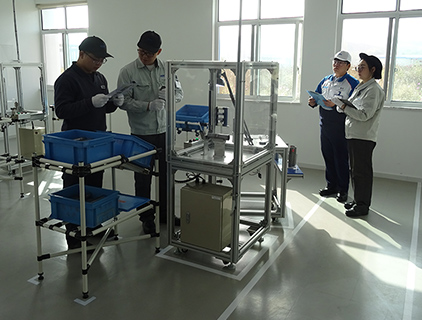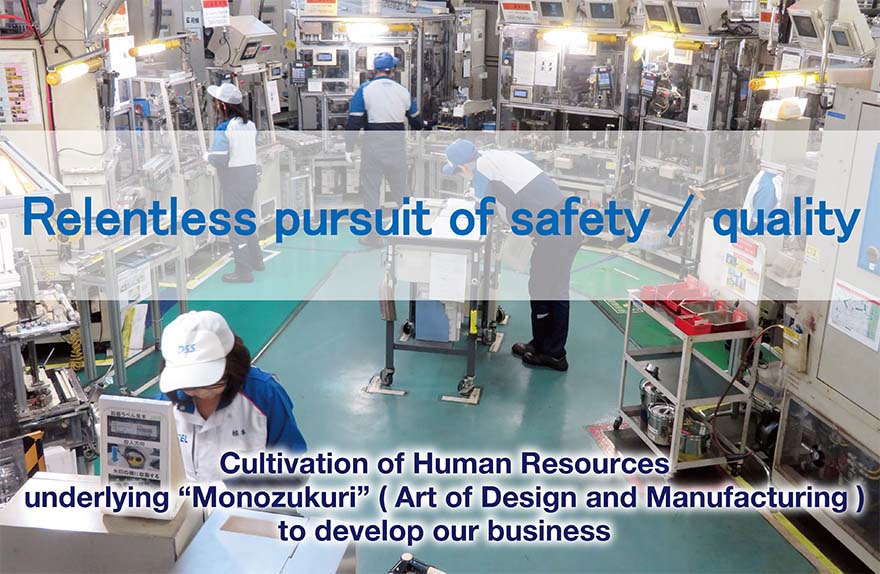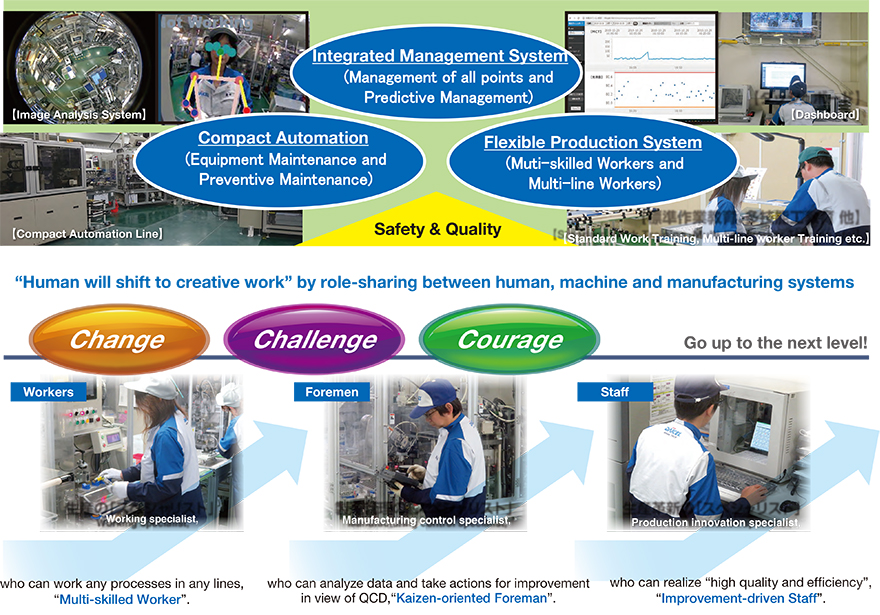Sustainability Harima Plant Human Development Center
Harima Plant Human Development Center
Purpose and Overview of the Human Development Center
The Safety Strategic Business Unit (Safety SBU) has developed expertise in pyrotechnic devices over many years. The company is applying this expertise in the development, manufacture, and sales of products such as inflators for automobile airbags and micro gas generators for seatbelt pretensioners (PGG), and it is conducting its business operations on a global scale.
Safety SBU’s manufacturing style is “assembly-based,” which is very different from “process-based” chemical manufacturing, so the Daicel Safety Systems (DSS) Human Development Center was established as a facility specialized in the development of human resources for assembly-based manufacturing. It was renamed to the Human Development Center in 2018. It will play an integral role in developing the human resources who drive the growth of the Safety Systems business to keep pace with its globally expanding operations.
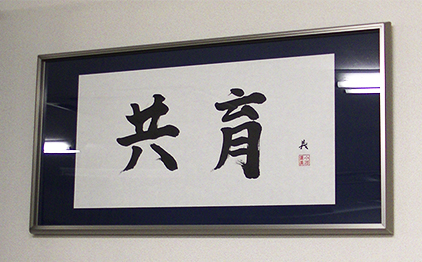
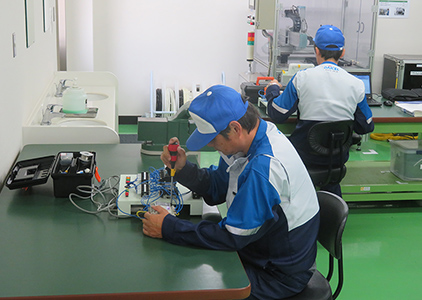
Harima Plant Human Development Center
The Kanji characters used in the Japanese name signify the following intentions:
(1) Collaborate across organizational and regional boundaries and grow together
(2) All employees regardless of rank help each other to reach new heights together
(3) Provide learning opportunities for those who provide training and those who receive training
The Human Development Center is engaged in human resources development and focuses on the following four missions based on our belief that the growth and potential of our human resources supports the growth of the company.
(1) DSS Human Resource Development Specialized in Manufacturing Skills
(2) Manufacturing Training for Technology Development in the Safety Systems Division
(3) Safety Training at Harima Plant
(4) Global Development of Engineers
Human Resource Development for DSS-Style Manufacturing
DSS manufactures inflators for automobile airbags at its Harima Plant in Japan. Under its motto, “Safety and Quality,” the company strives to strengthen and grow its manufacturing capabilities while basing its activities on these goals: 1) building an automated assembly line for highly efficient manufacturing; 2) develop multi-skilled workers for a flexible production line; and 3) leverage the latest IoT technology for an integrated management system. The company is therefore focused on developing human resources who contribute to achieving these goals.
The Human Development Center has established its own structure for educational programs, including (1) position-specific programs, such as training for new employees, operators, supervisors, and leaders, (2) specialized programs encompassing manufacturing knowledge and skills specific to each job type, and (3) development of certification or qualification systems for specialized or key processes. The educational programs cover the knowledge and skills required for manufacturing processes, including standard procedures based on TPS (Toyota Production System), IE (Industrial Engineering), statistical quality control, problem-solving skills, and equipment maintenance. Trainees acquire this knowledge and related knowledge and skills through not only classroom lectures but also hands-on experience.
Enrollees in Training Programs (Person Days)
| FY | 2021/3 | 2022/3 | 2023/3 |
|---|---|---|---|
| (1) General Training | 1,182 | 323 | 523 |
| (2) Specialized Training | 878 | 1,344 | 685 |
| (3) Qualification | 17 | 2 | 8 |
We have four specialized rooms for these lectures: Assembly Dojo, Maintenance Dojo, Safety Dojo, and Quality Dojo. We use the term “Dojo” to encourage participants to view these facilities as places where they can deepen self-awareness and develop the discipline necessary for independently acquiring and practicing the targeted skills.
Assembly Dojo
This dojo provides training for inflator assemblies and also develops trainers for this process.
In order to guarantee safety, quality, and operability, new employees and contractors receive training here using simulation devices as part of their onboarding process. This ensures they have the standard level of knowledge and skills before engaging in production line operations. In addition, the space is equipped with various simulation devices, each tailored for specific product types and procedures. The devices are used to develop multi-skilled workers and contribute toward maintaining a flexible production line. The dojo also provides training and certifications for operator trainers as well as certifications for critical roles, such as visual inspectors, among other roles.
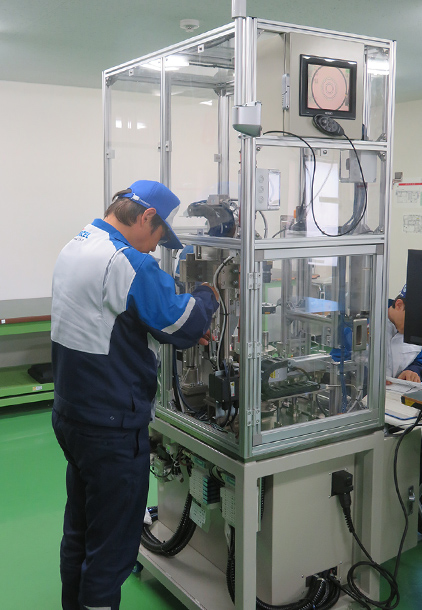
Maintenance Dojo
The focus in this dojo is on the knowledge and skills required for facility maintenance.
Trainees are provided basic knowledge about electrical and mechanical engineering as well as practical application lectures on machining processes such as drilling and tapping, electrical wiring, soldering, and sequence programs.
Two types of training are conducted. The Line-Keeper Development Program (six months) is intended to train key maintenance persons for the manufacturing division, and the Machine-Keeper Development Program (four days) helps trainees develop their daily maintenance knowledge and gives them troubleshooting skills for common problems.
In the final phases of the Line-Keeper Development Program, trainees create end-to-end processes from scratch, i.e., assembling a training device from component parts, create a sequence program for the device, and confirm its operation. Through these exercises, they learn about the focus areas for adjusting devices and acquire the practical skills for maintaining them.
In addition, trainees also go through other exercises, such as troubleshooting for intentionally introduced failures in simulation devices and teaching X-Y robots and multiple axis robots. Through these exercises, the dojo passes on the knowledge and skills to the next generation and improves facility maintenance competency.
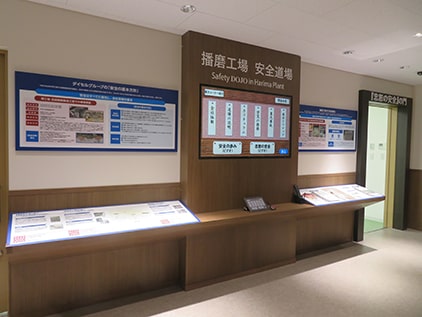
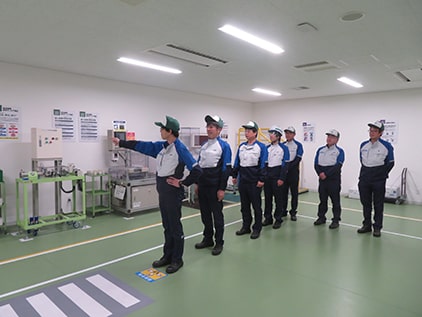
Safety Dojo
The focus here is on safety, and training at the dojo is part of the site training for the Harima Plant in order to prevent occupational accidents. The Safety Dojo works toward the following goals: 1) provide a place dedicated to helping trainees learn from past incidents and gain self-discipline; 2) give trainees opportunities to become accustomed to factory rules and regulations; and 3) enable trainees to cultivate their awareness and an accurate understanding of safety.
The dojo consists of two areas: where materials and photos of past occupational accidents at Harima plant are exhibited, and a training area with simulators and where trainees attend lectures.
There are five zones in the training area: 1) the factory rule zone, where trainees get accustomed to factory rules such as those related to customary greetings, dress codes, and pointing-and-calling procedures; 2) the basic behavior zone, and the 3) operation zone and 4) practice zone, where trainees learn safety basics for production activities and gain experience; and 5) the safety pledge zone, where trainees chant the safety slogan.
Safety Dojo activities are available to approximately 1,200 people, including everyone at the Plant and Group employees.
Enrollees in the Safety Dojo (Person Days)
| FY | 2021/3 | 2022/3 | 2023/3 |
|---|---|---|---|
| Safety Dojo Training | 3,820 | 3,609 | 3,440 |
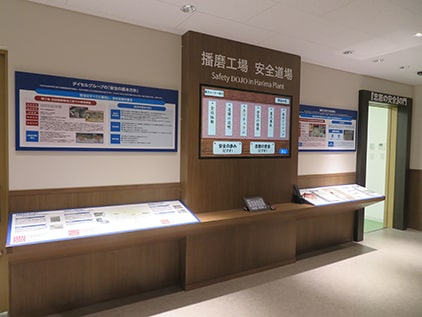
Since Harima Plant handles explosives, the dojo is equipped with devices that simulate explosions caused by static electricity. Trainees learn about the risks of these situations and the importance of removing electrostatic charges. The dojo is also equipped with devices that simulate entanglements, residual air pressure, and ascending or descending stairs.
During the sessions, trainees are divided into 77 teams, each consisting of about 20 people, and each team is led by an instructor. Rather than trying to explain difficult concepts with words alone, the dojo curriculum is focused on having trainees experience risks with games-based activities, hands-on experiences, and the use of simulators.
The goal in this dojo is to cultivate at Harima Plant what we refer to as a “safety-first work culture” with all of the workers. We try to achieve that by having each employee diligently conduct basic manufacturing activities, such as customary greetings, pointing and calling procedures, and 3S (Seiri “Sorting,” Seiton “Setting-in-Order,” and Seisou “Shining”) activities which are designed to trigger changes in their behavior. Repeated practice ultimately makes these habits the standard and leads to a workplace free from occupational accidents.
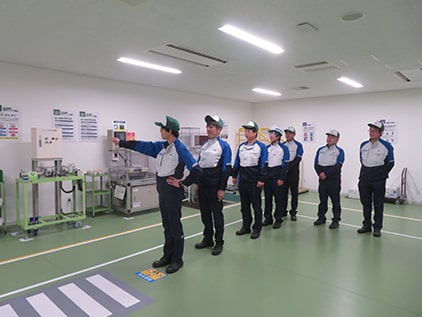
Quality Dojo
Here, trainees learn the importance of and concepts behind maintaining quality in order to deliver safe and reliable products to all customers. Because the products we make help protect lives, this training is a reconfirmation that even one defective product among a million is 100% defective for our customers. Videos are also used to communicate past serious defects, explore the state of mind of the employees who actually dealt with the problem at the time, and what those employees would like to emphasize to their colleagues today. The aim is to impart the magnitude of the impact that serious defects have. Additionally, we use group discussions to educate employees on what is necessary to prevent problems from occurring or from reaching customers so it becomes second nature to them. Quality Dojo training is also provided to all employees working at Harima Plant.
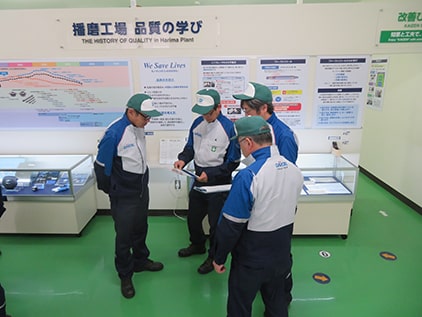
Global Engineer Development
Besides Japan, the Safety Strategic Business Unit operates five manufacturing sites in four other countries (the U.S., China, Thailand, and Poland). In addition to each location’s own training and development programs, the Human Development Center trains and certifies trainers specialized in critical roles and develops special skills to ensure that the same level of safety and quality are being incorporated into manufacturing practices worldwide. As of March 2023, there are 25 certified trainers across the globe, and each one trains and certifies new trainers locally at the various business sites.
We also opened four dojos, one each for safety, quality, maintenance, and assembly, at Daicel Safety Systems (Jiangsu) Co., Ltd. (DSSC) in China and Daicel Safety Systems (Thailand) Co., Ltd. (DSST) in Thailand to provide training.
We conduct training and development programs tailored to local cultures and the scale of each business site based on our relentless pursuit of safety and quality and we instill Daicel’s Monozukuri spirit.
